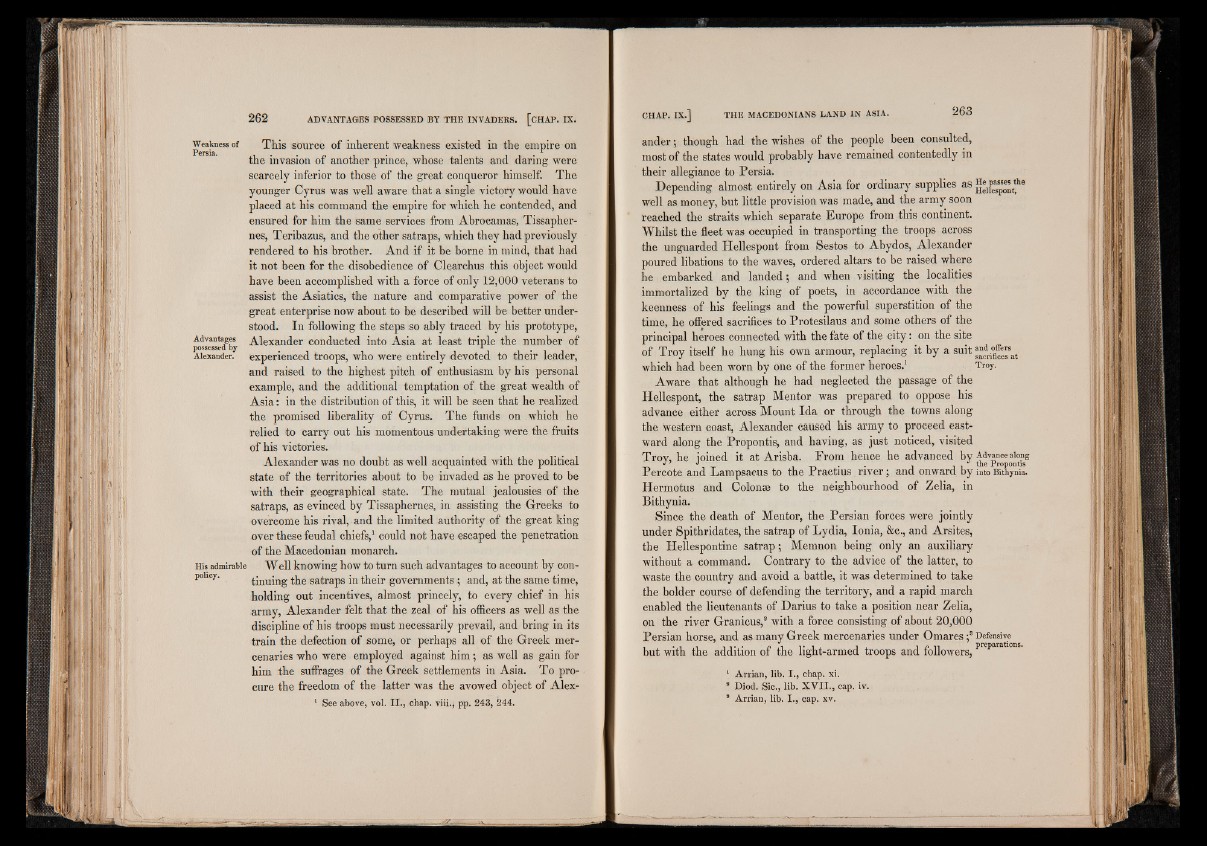
Weakness of
Persia.
Advantages
possessed by
Alexander.
His admirable
policy.
This source of inherent weakness existed in the empire on
the invasion of another prince, whose talents and daring were
scarcely inferior to those of the great conqueror himself. The
younger Cyrus was well aware that a single victory would have
placed at his command the empire for which he contended, and
ensured for him the same services ii'om Abroeamas, Tissapher-
nes, Teribazus, and the other satraps, which they had previously
rendered to his brother. And if it be borne in mind, that had
it not been for the disobedience of Clearchus this object would
have been accomplished with a force of only 12,000 veterans to
assist the Asiatics, the nature and comparative power of the
great enterprise now about to be described will be better understood.
In following the steps so ably traced by his prototype,
Alexander conducted into Asia at least triple the number of
experienced troops, who were entirely devoted to their leader,
and raised to the highest pitch of enthusiasm by his personal
example, and the additional temptation of the great wealth of
Asia: in the distribution of this, it will be seen that he realized
the promised liberality of Cyrus. The funds on which he
relied to earry out his momentous undertaking were the fruits
of his victories.
Alexander was no doubt as well acquainted with the political
state of the territories about to be invaded as he proved to be
with their geographical state. The mutual jealousies of the
satraps, as evinced by Tissaphernes, in assisting the Greeks to
overcome his rival, and the limited authority of the great king
over these feudal chiefs,1 could not have escaped the penetration
of the Macedonian monarch.
Well knowing how to turn such advantages to aceount by continuing
the satraps in their governments ; and, at the same time,
holding out incentives, almost princely, to every chief in his
army, Alexander felt that the zeal of his officers as well as the
discipline of his troops must necessarily prevail, and bring in its
train the defection of some, or perhaps all of the Greek mercenaries
who were employed against him; as well as gain for
him the suffrages of the Greek settlements in Asia. To procure
the freedom of the latter was the avowed object of Alex-
1 See above, vol. I I ., chap. viii., pp. 243, 244.
ander; though had the wishes of the people been consulted,
most of the states would probably have remained contentedly in
their allegiance to Persia.
Depending almost entirely on Asia for ordinary supplies as
well as money, but little provision was made, and the army soon
reached the straits which separate Europe from this continent.
Whilst the fleet was occupied in transporting the troops across
the unguarded Hellespont from Sestos to Abydos, Alexander
poured libations to the waves, ordered altars to be raised where
he embarked and landed; and when visiting the localities
immortalized by the king of poets, in accordance with the
keenness of his feelings and the powerful superstition of the
time, he offered sacrifices to Protesilaus and some others of the
principal heroes connected with the fate of the city: on the site
of Troy itself he hung his own armour, replacing it by a suit 3"d°fi^ sn,
which had been worn by one of the former heroes.1 Troy.
Aware that although he had neglected the passage of the
Hellespont, the satrap Mentor was prepared to oppose his
advance either across Mount Ida or through the towns along
the Western coast, Alexander caused his army to proceed eastward
along the Propontis, and having, as just noticed, visited
Trov, he ioined it at Arisba. Prom hence he advanced b y Advance along •' *' Percote and Lampsacus to tIhe TPra»ct*ius* ri ver; and1 onward1 1b y Pr0P0Dt1S into Bithynia.
Hermotus and Colonse to the neighbourhood of Zelia, in
Bithynia.
Since the death of Mentor, the Persian forces were jointly
under Spithridates, the satrap of Lydia, Ionia, &c., and Arsites,
the Hellespontine satrap; Memnon being only an auxiliary
without a command. Contrary to the advice of the latter, to
waste the country and avoid a battle, it was determined to take
the bolder course of defending the. territory, and a rapid march
enabled the lieutenants of Darius to take a position near Zelia,
on the river Granicus,2 with a force consisting of about 20,000
Persian horse, and as many Greek mercenaries under Omares ;3 Defensive
but with the addition of the light-armed troops and followers, prepara I0ns‘
1 Arrian, lib. I ., chap. xi.
s Diod. Sic., lib. X V I I ., cap. iv.
“ Arrian, lib. I ., cap. xv.